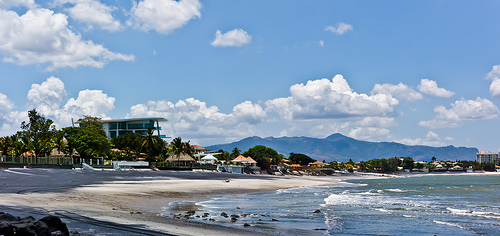Are prices going up in Latin America? Yes. They never go down anywhere, do they? Unless, of course, there is a housing crisis such as the U.S. experienced in recent years.
There's been no housing crisis practically anywhere in Latin America (except, perhaps, the U.S. territory of Puerto Rico), so prices have stayed a slow-but-steady upward course. And no matter what you may have heard, although the influx of foreign retirees may be causing housing prices to rise in certain locations, we expats are not the primary contributors to pricing increases.

Photo Courtesy of Hugo Ghiara, InternationalLiving.com
Remember, the U.S. and Canada don't have a lock on the baby boomer generation. Latinos who have spent their careers working abroad are coming home. They have money to spend and are looking to purchase a nice retirement home in Mexico, Ecuador, Panama, Argentina.... Like you, they know their retirement income will go much farther there and offer them the type of lifestyle they can't afford elsewhere.
And as in Ecuador, where we live, younger Latinos who left their home countries for work opportunities in Europe and North America are also now returning home. Many have been laid off and can no longer find jobs abroad. And other immigrants from neighboring South American countries are coming to places like Ecuador, too, where the economy is strong.
And, of course, there are Ecuadorians of retirement age who never left Ecuador. Many are looking to get out of the cities and buy a retirement home in the country or in a smaller city like Cuenca.
The same thing is happening throughout Latin America. But still, places like Ecuador remain a bargain.
As a Canadian journalist who spent time in Ecuador recently, including a month in an apartment in Cuenca, wrote: "A taxi ride from Old Town in Quito to the Mariscal district is a negotiated $3. A haircut costs $3 and a manicure and pedicure between $6-$12. A set menu called 'del dia' for lunch can be as cheap as $2.50 and that includes juice, potato and corn soup, entree of fish or pork (usually) and dessert. Lots of hotels and hostels offer rooms with private bathrooms for less than $50. And that includes breakfast that always has exotic fruit juices as part of the buffet. And free Internet. It's easy to see why so many North Americans are moving here. It's cheaper to live, eat and you can get 10 percent on your money in a savings account at the bank when you get your residence card."
And although real estate sales and rental prices in Latin America may be inching upwards, you'll still find plenty of bargains -- especially if you're willing to take your time and look beyond the "gringo neighborhoods." Even in those areas, prices are far lower than you'll pay for comparable properties back home.
And remember, your carrying costs -- property taxes, etc. -- are negligible here. And the longer you live here and the more "local" you become, the more ways you'll find to save on your daily living costs.
Our utility costs are the same as they've always been, for example -- about $25 a month for electricity, $2.50 for a bottle of propane that lasts six weeks. Gasoline prices are still $1.50 a gallon. (Note: Ecuador's president has proposed eliminating the subsidies that keep these prices low, so they're likely to go up in the future.)
By shopping around a bit, we've actually been able to lower the cost of our telephone and Internet package to less than $50 a month (with a half-price discount for the first month). Our property tax for 2012? Just $53.37.
And by switching to a more plant-based diet and (confession) reducing our wine consumption, we've lowered our grocery budget considerably... probably by at least 50 percent. So now we dine out more! (We've had a friend visiting this past week and we've been out to dinner every night. We don't recall a single bill being more than $25 or $30 for three of us... drinks included.)
Read More:
Cost of Living Overseas: Live Well from $1,000 a Month
Property Prices Fall in Boquete, Panama
San Miguel de Allende, Mexico: Why Now is the Time to Buy Property There
Earlier on Huff/Post50:
